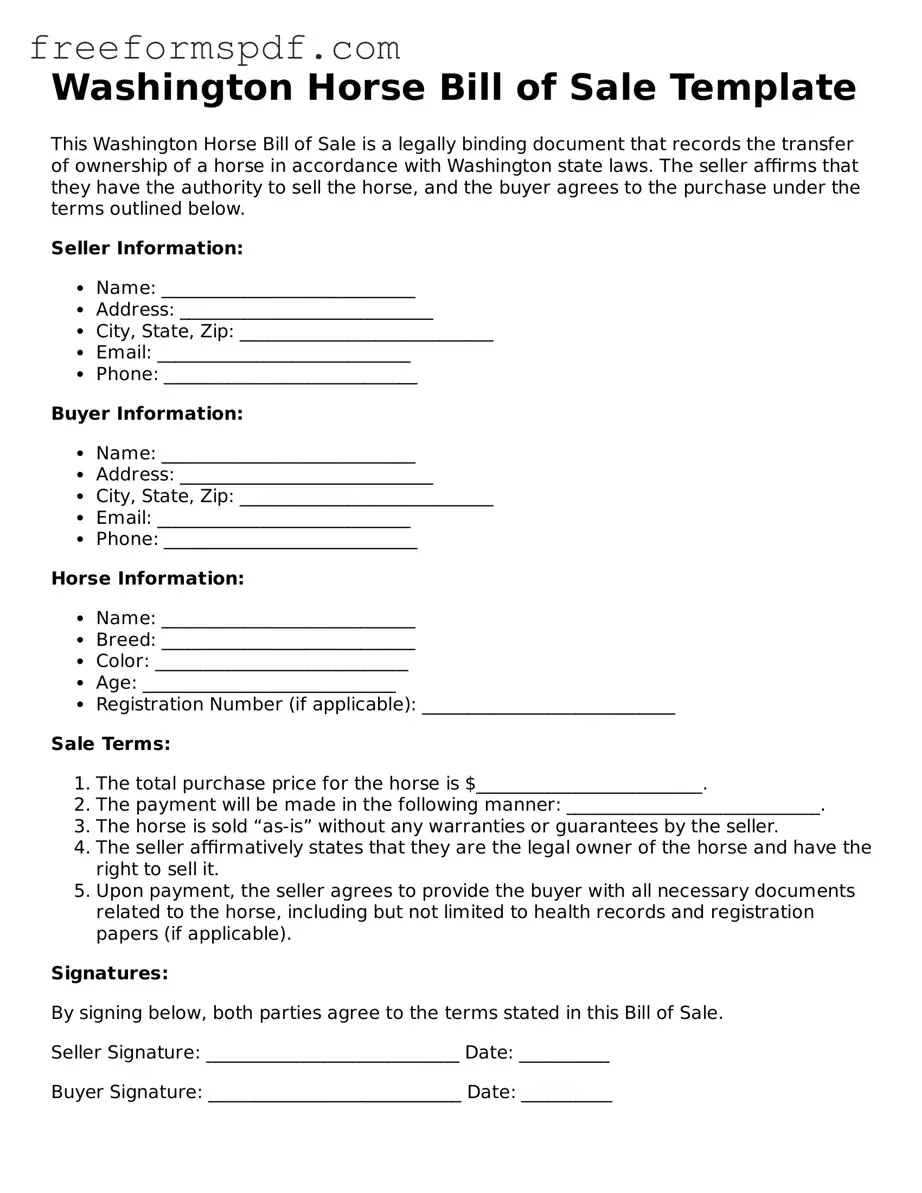Attorney-Verified Horse Bill of Sale Document for Washington State
Common mistakes
-
Incomplete Information: One of the most common mistakes occurs when individuals fail to provide all required details. This can include missing the horse's registration number, neglecting to include the seller's or buyer's full name, or omitting the date of the sale. Each piece of information is crucial for establishing a clear and legal transaction.
-
Incorrect Horse Description: A detailed description of the horse is vital. Some people mistakenly provide vague or inaccurate descriptions. This might involve omitting important characteristics such as breed, age, color, or markings. An unclear description can lead to disputes later on, making it essential to be thorough.
-
Failure to Sign: It may seem simple, but forgetting to sign the form is a frequent oversight. Both the buyer and seller must sign the bill of sale for it to be legally binding. Without signatures, the document lacks validity, and the transaction may be called into question.
-
Not Keeping Copies: After completing the form, individuals often forget to keep copies for their records. It is crucial for both parties to retain a signed copy of the bill of sale. This serves as proof of the transaction and can be important for future reference, such as for registration or if any disputes arise.
Learn More on This Form
-
What is a Horse Bill of Sale in Washington?
A Horse Bill of Sale is a legal document that records the sale of a horse. It serves as proof of the transaction between the buyer and the seller. This document includes important details such as the horse's description, the sale price, and the names and addresses of both parties involved.
-
Is a Horse Bill of Sale required in Washington?
While a Horse Bill of Sale is not legally required in Washington, it is highly recommended. Having a written agreement protects both the buyer and the seller. It provides clear evidence of the sale and can help resolve any disputes that may arise later.
-
What information should be included in the Horse Bill of Sale?
The Horse Bill of Sale should include:
- The full names and addresses of the buyer and seller.
- A detailed description of the horse, including its name, breed, age, color, and any identifying marks.
- The sale price and payment method.
- The date of the sale.
- Any warranties or guarantees regarding the horse's health or condition.
-
Do I need to have the Horse Bill of Sale notarized?
No, notarization is not required for a Horse Bill of Sale in Washington. However, having the document notarized can add an extra layer of authenticity. It may also be helpful if you ever need to prove the sale in court.
-
Can I use a Horse Bill of Sale for other animals?
While a Horse Bill of Sale is specifically designed for horses, similar documents can be created for other animals. However, each type of animal may have different considerations and requirements. Always ensure that the document is tailored to fit the specific animal being sold.
-
What happens if there is a dispute after the sale?
If a dispute arises after the sale, the Horse Bill of Sale can be a crucial piece of evidence. It can clarify the terms of the sale and any representations made by the seller. If the issue cannot be resolved between the parties, it may be necessary to seek legal advice or mediation.
Misconceptions
When it comes to the Washington Horse Bill of Sale form, there are several misconceptions that can lead to confusion. Let’s clear up some of these misunderstandings.
-
It’s only necessary for expensive horses.
Many people believe that a bill of sale is only required for high-value transactions. In reality, it’s a good practice to have a bill of sale for any horse sale, regardless of price. This document provides clear proof of ownership and the terms of the sale.
-
A verbal agreement is sufficient.
Some sellers think a handshake or verbal agreement is enough. However, without a written bill of sale, you may face challenges later if disputes arise. Having everything documented protects both the buyer and the seller.
-
The form is only for private sales.
Many assume that the bill of sale is only needed for private transactions. In fact, it’s also essential for sales through dealers or auctions. It serves as a record of the sale, no matter how the transaction occurs.
-
It’s a complicated document.
Some people worry that the bill of sale is filled with complex legal terms. In truth, the Washington Horse Bill of Sale is straightforward. It includes basic information about the horse and the sale, making it easy to complete.
-
Once signed, it can’t be changed.
There’s a belief that a signed bill of sale is set in stone. However, if both parties agree, they can amend the document. Just make sure any changes are documented and signed by both parties to avoid future confusion.
Understanding these misconceptions can help ensure a smooth and legally sound transaction when buying or selling a horse in Washington.
Some Other Horse Bill of Sale State Templates
Free Horse Bill of Sale - It may include a clause about the transfer of any accessories or equipment included in the sale.
For those navigating the intricacies of vehicle transactions, understanding the significance of a specific Arizona Motor Vehicle Bill of Sale can be invaluable. This document not only provides crucial details regarding the sale but also ensures compliance with local regulations, protecting both buyers and sellers in the process.
